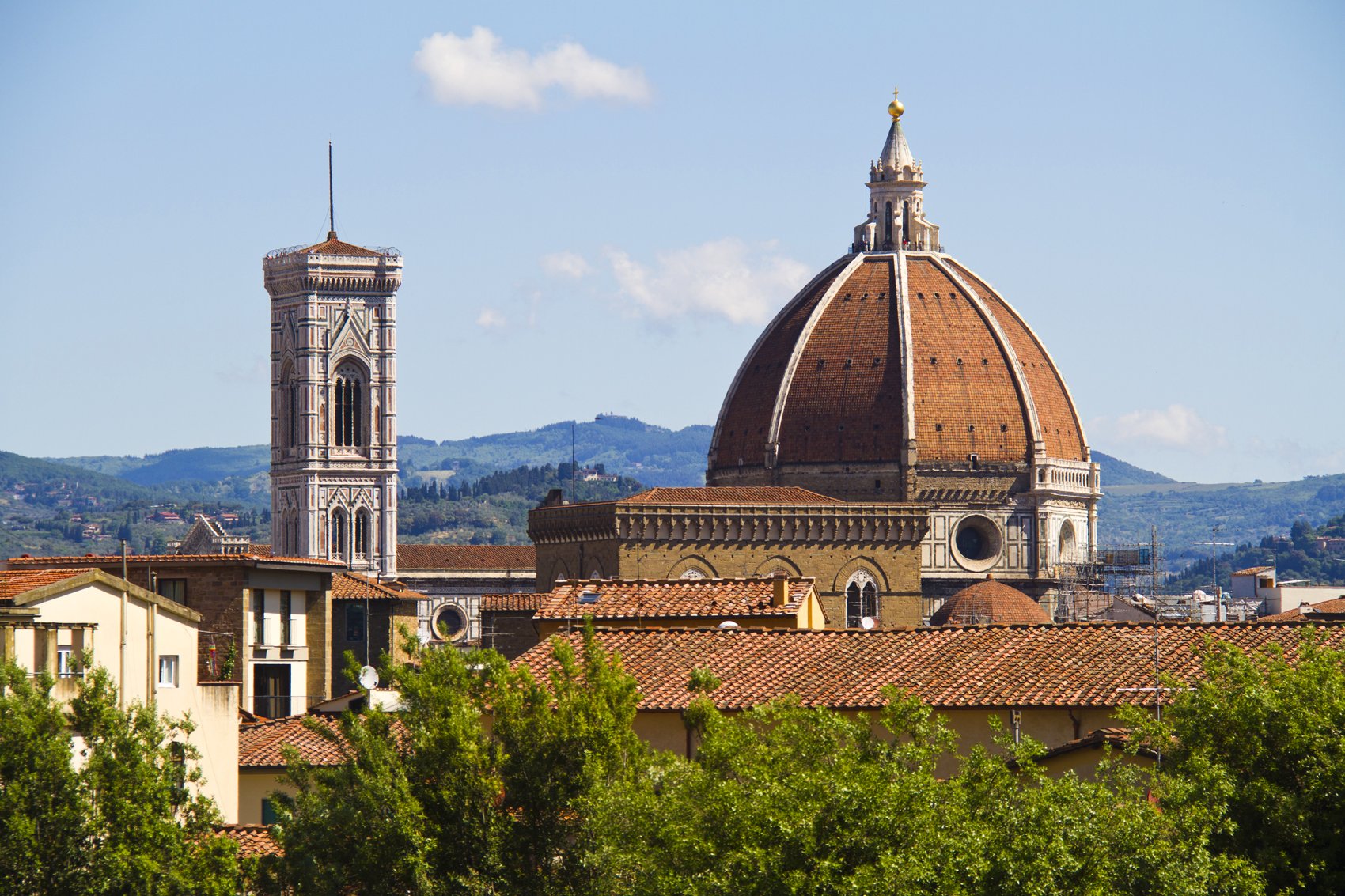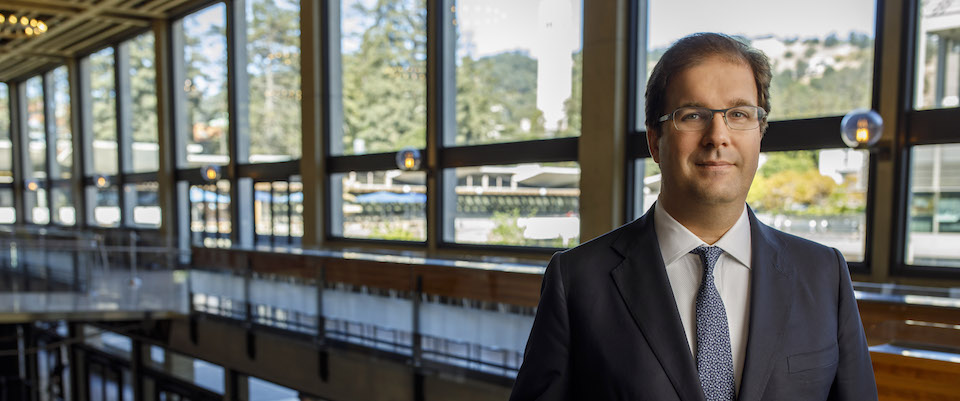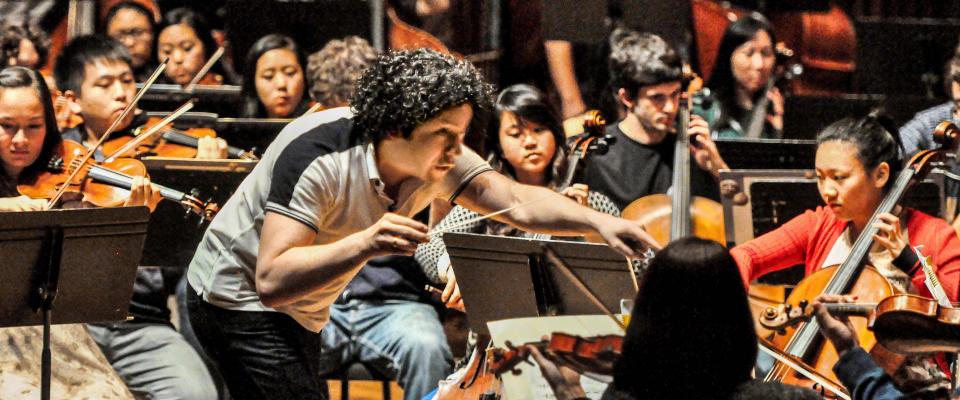A newly commissioned work gives voice to student stories.
Cal Performances isn’t in the habit of weighing in on topical controversies, but when it comes to defending Cal students, the organization decided it was time to raise a voice.
Make that many voices—Cal Performances has assembled a stellar roster of artists to create an oratorio inspired by the stories of undocumented students living in fear that they and their families could be uprooted at any moment.
Cal’s interest in the fate of undocumented students predates the 2016 election by years.
The long-planned collaboration between composer and UC Berkeley alum Jimmy López and Pulitzer Prize–winning playwright Nilo Cruz took a sudden turn following the 2016 election, however. The new administration seemed set on ending Deferred Action for Childhood Arrivals, or DACA, which provided protections for undocumented people brought to the United States as children. Those protections were suddenly called into question.
Originally titled Dreamer but recently rechristened as the plural Dreamers, the oratorio was initially envisioned to braid all the students’ stories together to create a single narrative. Its three primary sections would cover life before coming to the U.S., then crossing the border and the perils that entailed, and third, a vision of the future. But with the students under increasing pressure and no signs of resolution in sight, even the oratorio’s title became contentious.
While once embraced as a signifier representing aspirations for citizenship, the term “dreamer” is now seen by some undocumented students as a divisive label “that places fault on parents,” says Liliana Iglesias, academic counselor and coordinator of Cal’s Undocumented Student Program. “They don’t like that term anymore and prefer to be referred to as ‘undocumented.’ It comes out of wanting to challenge this idea of the bad immigrant and good immigrant who’s more deserving.”
What’s not being debated at Cal Performances is the significance of taking a stand in defense of vulnerable students and alumni. Commissioning new works became a major part of the Cal Performances purview in the 1980s under the tenure of Robert Cole, who turned a respected regional organization into an international force. The mission continued under his successor, Matías Tarnopolsky, who spearheaded major commissions such as choreographer Robert Battle’s Awakening for the Alvin Ailey American Dance Theater, and Mark Morris’s Layla and Majnun.
Tarnopolsky set Dreamers in motion, a co-commission with Stanford Live, supported through a Hewlett 50 Arts Commissions grant, and Rob Bailis, Cal Performances’s interim artistic director, has kept the project on track. He sees Dreamers as far more than an important work by two celebrated artists. Rather, the piece amplifies the fundamental calling of Cal Performances.

“I think it’s the responsibility of any member of a democracy to protect and defend the rights of all members,” Bailis declares. “We felt a convening power in the commissioning of a new work. The platform of Cal Performances is huge and as one of the greatest universities, what we do matters. What we do is visible and takes a clear position, and we will be heard.”
Cal’s interest in the fate of undocumented students predates the 2016 election by years. In January 2011, Cal launched the Undocumented Student Program (USP) to focus services available to the estimated 500 undocumented students on campus, a program believed to be the first of its kind in the nation. President Obama’s initial announcement of the DACA program in June of 2012 was greeted by a surge of student optimism and pride, with dozens stepping forward to openly demonstrate for full legal status. But the changing post-election climate sent a chill through the University’s halls, and students grew increasingly jumpy.
“There’s been a lot of anxiety,” says USP’s Iglesias. “We’ve had a few cases where Department of Homeland Security vans have been spotted, and people were really anxious, though we were able to clarify they weren’t here for enforcement. In one instance, someone saw what looked like an Amazon delivery person trying to take a package to a student co-op, and it looked like they were with ICE. We couldn’t confirm that. It’s not a joke. The community is highly vigilant.”
When López and Cruz started sitting down with DACA students to hear their stories, the two recognized risks the students were taking. Notes from the meetings were never transmitted via email. “We sent them by mail and then they were destroyed,” López says. “We didn’t take any chance of them getting out on the Web. The interviews were very emotional, and I don’t think I was entirely prepared for that.”
López, born and raised in Peru, found that DACA status could highlight family divisions, as when an undocumented student had siblings who were born in the U.S.
Once embraced as a signifier of aspirations for citizenship, the term “dreamer” is now seen by some undocumented students as a divisive label.
“One has all the privileges, and one does not,” he says. “For all of them, the one thing that was most upsetting was that parents had no hope of becoming legal. Even with DACA as a palliative, their parents made an enormous sacrifice that they can never pay back. Some crossed the border physically, and some overstayed visas. Some came from Mexico fleeing poverty and drug cartels; some from El Salvador fleeing war-torn areas. The experiences are really different. Some came as little children and only found out their undocumented status when applying to college.”
An oratorio might seem like “a very formal choice,” Bailis acknowledges, in the face of a fear-soaked climate that has driven the students who initially shared their stories with López and Cruz underground (none who spoke with the press last year were willing to go back on the record). Featuring a narrative set for orchestra and voices, presented without costumes, scenery, or stage craft, oratorios usually focus on sacred themes. Handel’s Messiah is the most famous example. For López and the Cuban-born Cruz, the journey of children seeking safety resonates deeply with the musical form’s religious connotations. They decided to set most of the text in English, but made sure to include one movement in Spanish to tap into “how you use the cadence of your language, with its own musicality,” López explains. “That informs how you construct rhythms and motifs. But I did not want to listen to tapes of the interviews over and over again. I wanted to separate the literal stories and find inspiration in Nilo’s words.”
Exploring a fraught, ripped-from-the-headlines political controversy could use the surgical skills of documentary theater artist Anna Deavere Smith, or the primal rock energy of Green Day. But with López living in Berkeley, Cal Performances couldn’t resist a composer “with the highest level of artistic expression when it comes to setting text and understanding narrative,” Bailis says. “Tapping into that soaring gift for melody and desire to tell a story with voice, that was a real drive.”
Dreamers isn’t the first López-Cruz collaboration exploring the intricacies of language. They launched their creative partnership with the acclaimed opera Bel Canto, which was commissioned by the Lyric Opera of Chicago under the auspices of Renée Fleming and premiered there at the end of 2015. Based on the Ann Patchett novel, which was also turned into a film starring Julianne Moore that opened in September, the story is drawn from the Japanese Embassy hostage crisis that unfolded in Lima in 1996–97, with a libretto including lines in Spanish, English, Japanese, Russian, German, and French. “We had a second collaboration, a poem that Nilo gave me and my husband as a present,” López says. “But that wasn’t meant for the public, so officially speaking, Dreamers is our second project.”
In classical music, the oratorio is the form that carries cautionary tales. You have an opportunity to live in the cracks between fact and fiction.
With its braided stories of family trials set against an increasingly inhospitable political climate, the new oratorio arrives at a time of ratcheting tension. It’s not lost on anyone involved in Dreamers that Berkeley provides a singular stage for a work addressing a fraught controversy. The news value of conflict near campus means the media continue to glom onto stories emanating from Berkeley, a stage that’s been used and abused over the past two years. With various right-wing, alt-right, and conservative groups eagerly seeking out the national spotlight provided by Berkeley, self-described anti-fascist groups (antifa, for short) have seemed ready to oblige with a series of street battles.
Cal Performances is determined that the megaphone provided by a Berkeley dateline doesn’t get monopolized by pugilistic shouters. The humanizing message of Dreamers is amplified by the extraordinary array of talent. When the piece premieres at Zellerbach Hall on March 17, 2019, conductor Esa-Pekka Salonen will lead the Philharmonia Orchestra of London, as part of their Cal Performances residency. One of the soloists will be Grammy-winning Puerto Rican soprano Ana María Martínez, who more than held her own alongside Plácido Domingo at his powerhouse performance at the San Francisco Opera this past October. A production of this magnitude guarantees an international audience, calling out “to collaborators around the world as we all struggle with similar questions about rights and responsibilities,” Bailis says.
“This is one way to establish you’ll have allies with you in the thick of the fight. And in the realm of classical music, the oratorio is the form that carries cautionary tales. You have an opportunity to live in the cracks between fact and fiction. The form opens up a world that’s truthful and epic. It lives in this poetic space as the truth is told to us, handled very respectfully, via the amazing gift of Jimmy López.”
Even as Dreamers calls attention to the plight of the hundreds of thousands of people who gained some protections from DACA, the Cal students who offered their stories can’t stand up and claim credit without putting themselves in jeopardy. Despite recent court rulings, the students seem caught in hazardous limbo, their desire for safety and legal status at odds with the political climate of their home since childhood.
A Los Angeles native and first-generation American, Andrew Gilbert is a Berkeley-based freelance writer who has covered arts and culture since 1989, for numerous publications, including California.




















